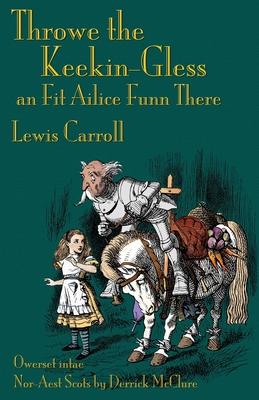Throwe the Keekin-Gless an Fit Ailice Funn There: Through the Looking-Glass in North-East Scots (Doric)

Throwe the Keekin-Gless an Fit Ailice Funn There: Through the Looking-Glass in North-East Scots (Doric)
For a general introduction to the literary and cultural background of the present translation, and to the North-East Scots dialect itself, see the introduction to my translation of Carroll's previous book, Ailce's Anters in Ferlielann. As there, I have used a conservative form of the dialect, checking the words and pronunciations against classic literary texts (and this time also against the earlier translation, to ensure consistency). As there too, I have endeavoured to find a specific equivalent for every joke, pun, allusion and other trick of style in the original. The metrical and rhyme patterns of the poems are maintained: as always in poetic translations of any kind, this procedure necessitates some departures from the original wording; and in one instance, namely the sequence of thirteen rhymes on "toe" in the closing section of the White Knight's song, I have assumed the licence to treat Carroll's lines with complete freedom. Puns and other forms of word-play appear at corresponding places to those in the source book: this too necessarily entails departure from the original wording, as in the Midgie's (Carroll's Gnat's) "Somethin about a haverin aiver, ye ken" to replace "Something about 'horse' and 'hoarse', you know". Culture-bound allusions are replaced with ones more readily associated with the expected new readership (his Anglo-Saxon messengers with their Anglo-Saxon attitudes becoming Pictish messengers with Pictish poseitions); and a clearly-differentiated speech-form, namely the Clydeside basilect, is again used for characters whose dialogue in the original suggests non-standard English (the Frog in Chapter IX and the Wasp in the "lost" episode). --Derrick McClure
PRP: 131.85 Lei
Acesta este Prețul Recomandat de Producător. Prețul de vânzare al produsului este afișat mai jos.
118.67Lei
118.67Lei
131.85 LeiIndisponibil
Descrierea produsului
For a general introduction to the literary and cultural background of the present translation, and to the North-East Scots dialect itself, see the introduction to my translation of Carroll's previous book, Ailce's Anters in Ferlielann. As there, I have used a conservative form of the dialect, checking the words and pronunciations against classic literary texts (and this time also against the earlier translation, to ensure consistency). As there too, I have endeavoured to find a specific equivalent for every joke, pun, allusion and other trick of style in the original. The metrical and rhyme patterns of the poems are maintained: as always in poetic translations of any kind, this procedure necessitates some departures from the original wording; and in one instance, namely the sequence of thirteen rhymes on "toe" in the closing section of the White Knight's song, I have assumed the licence to treat Carroll's lines with complete freedom. Puns and other forms of word-play appear at corresponding places to those in the source book: this too necessarily entails departure from the original wording, as in the Midgie's (Carroll's Gnat's) "Somethin about a haverin aiver, ye ken" to replace "Something about 'horse' and 'hoarse', you know". Culture-bound allusions are replaced with ones more readily associated with the expected new readership (his Anglo-Saxon messengers with their Anglo-Saxon attitudes becoming Pictish messengers with Pictish poseitions); and a clearly-differentiated speech-form, namely the Clydeside basilect, is again used for characters whose dialogue in the original suggests non-standard English (the Frog in Chapter IX and the Wasp in the "lost" episode). --Derrick McClure
Detaliile produsului











